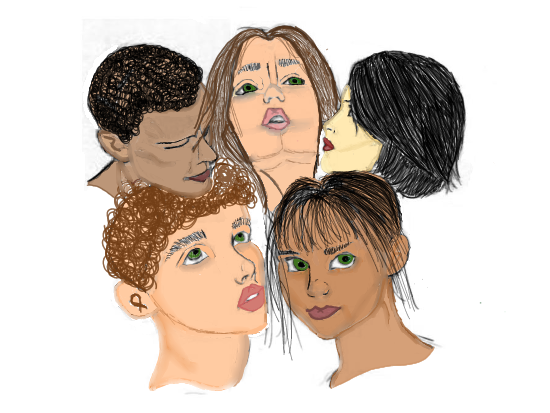Dangers of echo chambers
Critiquing the formation of political bubbles on social media platforms and beyond

Illustration credit | Shreshta Ranganathan
September 25, 2020
The outcome of the 2016 election — Donald Trump’s victory — and the consequent four years, exposed the deeply sown polarization within the United States. For some, the outcome was unexpected, and to an extent due to problematic features of social media, including unreliable and inaccurate polls, as well as the phenomena of echo chambers.
According to the organization GCF Global, “an echo chamber is an environment where a person only encounters information or opinions that reflect and reinforce their own.” Formed due to our tendency to seek out agreeable content, echo chambers are reinforced by platforms that feed into this concept with their personalized algorithms. Our stances on various topics — abortion, the defunding of the police, gun control — often have nothing to do with our true opinions, but rather our lack of confidence in challenging ideas and our conformity to social and political norms.
Rush Limbaugh, a conservative political commentator and radio personality articulates this when he says “the world is a struggle only between the good and the evil,” on behalf of the Fox News Team, which villainizes those with opposing viewpoints.
Echo chambers are prominent on social media platforms, where feeds are customized to suit users’ comfort zones. Though some may expect that the variety of people on these platforms will result in diverse interactions between contrasting viewpoints, the opposite often takes place; this is caused by the social media algorithms placing us in groups, and our tendency to mirror the views of the media we consume.
One of the strongest echo chambers is found within Twitter, because most of the content comes from a small portion of the user base. According to a study by the Pew Research Center, “about 80 percent of Tweets are sent by just 10 percent of users.”
Twitter’s large echo chambers are formed largely due to its personalized user algorithm. Twitter’s algorithm, like almost every other social media, curates content that aligns with people’s political or social views based on the types of tweets they like and retweet. Though this makes the social media platform maintain an active user base, it drowns out voices, often failing to display content that users may disagree with.
However, echo chambers can occasionally be a useful phenomena. It can provide a sense of community for those who are impacted by shared issues. For example, according to a paper from Santa Clara University, “Social media has been a tool to expand the LGBT community around the world.” The ongoing LGBTQ+ social media movements for equal rights bring a sense of unity and solidarity for those who face extreme prejudice and unjust treatment.
Additionally, they can help instigate positive changes, such as legislation in Congress. The New York Times highlights a specific instance in which large amounts of people participated in a social media campaign to help raise money for the American Civil Liberties Union to assist refugees impacted by Trump’s travel ban in 2017.

However, despite its occasional positive impacts, it is ultimately hard to support the inherent idea of echo chambers and their neglect for multiple perspectives.
A detriment of echo chambers is the consequent labeling of individuals. However, a single political label is a misinterpretation — individuals have complex personalities and can engage in critical thinking — and by being sucked into an echo chamber, individual thought is thrown out. For instance, people that have views in the middle of the spectrum get their voices drowned out or are forced to pick a side on either extreme, further contributing to the aforementioned polarization.
This has also manifested within the MVHS community, in the rise of social media activism among high school students. And when students receive and share information from inaccurate Instagram threads or TikToks, they inadvertently also contribute to an echo chamber.
Spreading knowledge and opinions is important and everyone should be allowed to do so and engage in meaningful discourse. However, when individuals are part of echo chambers, they rarely view opposing content, and their immediate instinct is to shut down those who disagree. By normalizing counterproductive hatred for groups seen as outsiders or opposition, echo chambers cause unnecessary polarization.
Echo chambers shouldn’t be eliminated altogether. Yet social media users need to learn to go out of their way and leave the bubble every now and then to become more open minded critical thinkers. Even if you don’t agree with the ideas presented, remaining ignorant to opposing views can be incredibly dangerous.
As a member of Generation Z, one of the most active generations on social media, wemust start using our platforms wisely. Researching opposing content doesn’t mean that you need to change your political views and values, but rather accept that other opinions are val
id as well. With the 2020 presidential candidate around the corner, we can’t bury ourselves within echo chambers — it’s time we explore outside the algorithm and get a grasp of where we are as a country. So the next time you’re looking through your social media apps, remember to venture out of your echo chambers and look at the world through different, critical lenses.




























